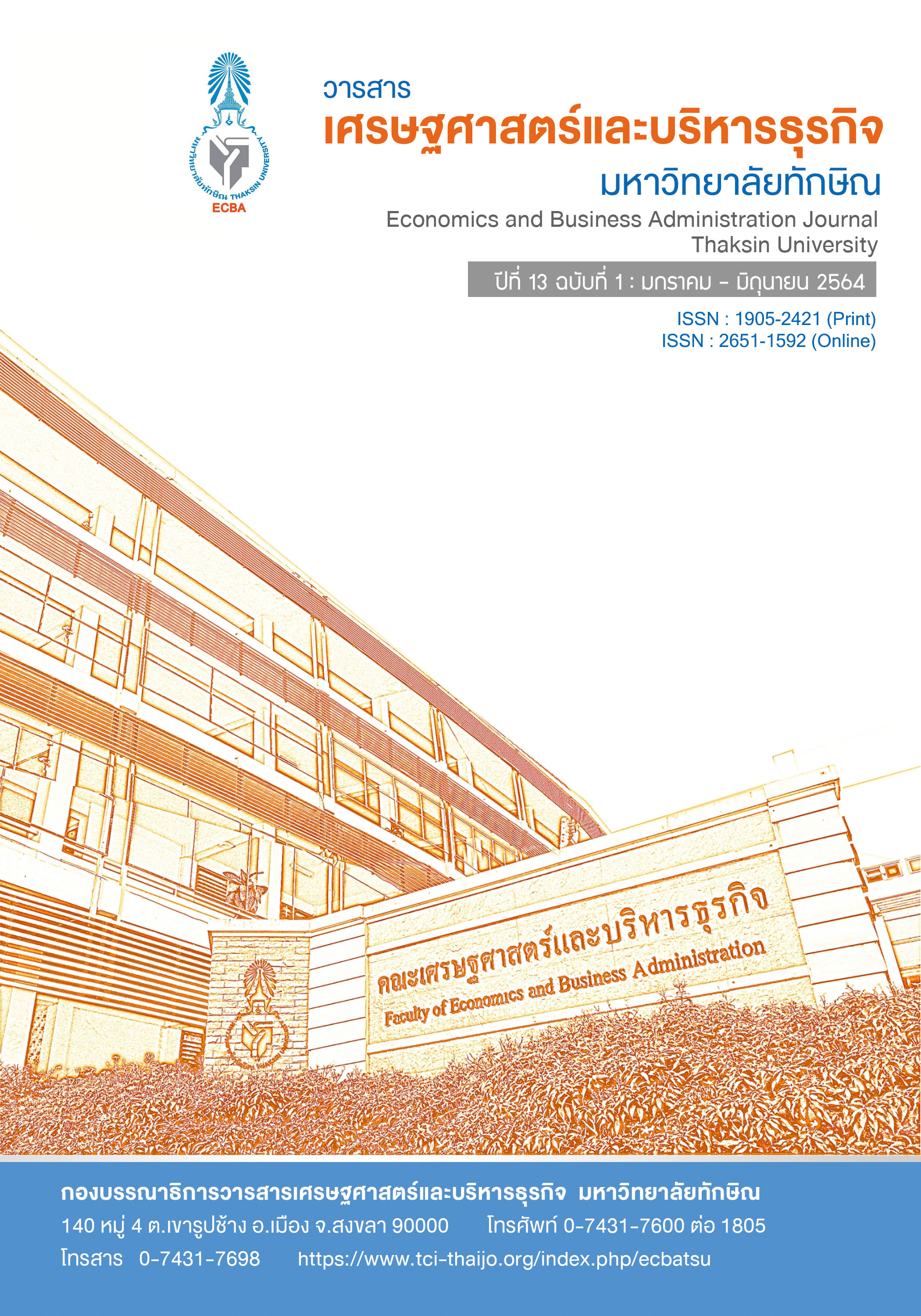A Study of Supply Chain Operarion of Safe Seafood Products: A Case Study of Satun’s Fisherfolk Social Enterprise
Keywords:
Social enterprise, Supply chain, Fisher folk, ManagementAbstract
The purpose of this study is to explore the supply chain activities of key stakeholders within the SCOR framework. The focus is on Satun Fisherfolk social enterprise. To gain an insightful understanding of the supply chain operation, a qualitative approach was conducted to explain how the social enterprise operates. The data collection methods include depth interview, small group discussion, and non-participant observation. The key informants who participated in the investigation are as follows: the managers of Satun Fisherfolk and Fisherfolk enterprise, Satun Fisherfolk employees, local wholesalers, and small scale fishermen. The voice recorder was used to capture the conversation. The transcribed data were interpreted and analyzed by using content analysis. The research findings reveal the key stakeholders in the Satun Fisherfolk supply chains as follows: (1) upstream supply chain including small scale fishermen and local wholesalers, (2) midstream supply chain consisting of Satun Fisherfolk, and (3) downstream supply chain including Bangkok Fisherfolk enterprise and retailers. Satun Fisherfolk is operating under the concept of sustainability. Its missions commit to focus on the triple bottom line concept including economic (profit), social (people), and environmental (planet) concerns. In terms of profit, Satun Fisherfolk can generate revenue to cover their expenses as well as have a high return of investment for its shareholders. In terms of people, Satun Fisherfolk purchases high-quality fresh seafood from small scale fishermen. Also, the enterprise produces clean products without any chemicals for the consumers. In terms of planet, Satun Fisherfolk spends the profits on marine conservative projects and sustainable small scale fisheries.
References
Amage, N., Aueaungkul, A., Bunmak, S., & Srichookiat, S. (2019). Sustainable procurement for enterprise: a case study of Fisherfolk shop Nakhon si thammarat. The National Conference on Business Management and Innovation 2019 (NCBMI 2019) “Transforming Business Enterprise” (456-462). Khonkaen: Khonkaen University. (in Thai)
Antonio, & Lau, K.W. (2011). The implementation of social responsibility in purchasing in Hong Kong/Pearl River Delta: A case study. Strategic Outsourcing: An International Journal, 4(1), 13-46.
Aueaungkul, A., Bunmak, S., Amage, N., & Srichookiat, S. (2020). Supply chain management of safe seafood products: A Case study of fisherfolk shop in Pracuap Khiri Khan province. WMS Journal of Management, 9(1), 37-51. (in Thai)
Bowersox, D. J., Closs, D. J., & Coope, M. B. (2002). Supply chain logistics management. New York: McGraw-Hill.
Chitchob, T., Sompan, N., Yaosamangmas, S., & Duangwaeo, P. (2014). Development of supply chain models of organic jasmine rice in Thailand. Gankasert, 42(2), 243–249. (in Thai)
Christopher, M. (2011). Logistics & Supply Chain Management (4th edition). Harlow: Pearson Education.
Kongkaew, J. (2015, June 19). ‘Fisherfolk’ tale of ‘Fish Catcher’. Bangkokbiznews. Retrieved from: http://www.bangkokbiznews.com/news/detail/651374 (in Thai)
Mont, O., & Leire, C. (2009). Socially responsible purchasing in supply chains: Drivers and barriers in Sweden. Social Responsibility Journal, 5(3), 388-407.
Noonin, S. (2014). Organizational analysis: Social. Journal of Social Sciences Srinakharinwirot University, 17(1), 358-372. (in Thai)
Ntabe, E. N., LeBel, L., Munson, A. D., & Santa-Eulalia, L. A. D. (2015). A systematic literature review of the Supply Chain Operations Reference (SCOR) model application with special attention to environmental issues. International Journal of Production Economics, 169, 310–332.
Nuchpiam, P., Prateeppornnarong, D., & Jenjarrussakul, B. (2018). Social enterprise in Thailand: Some observations on the social enterprise promotion bill. Journal of Thai Ombudsman, 11(1), 109-141. (in Thai)
Pagell, M., Wu, Z., & Wasserman, M. E. (2010). Thinking differently about purchasing portfolios: an assessment of sustainable sourcing. Journal of Supply Chain Management, 46(1), 57-73.
Sangworn, S., & Teeravaraprug, J. (2012). Supply chain cost of pickled fish: Case study - OTOP Banmi Lopburi. MUT Journal of Business Administration, 9(1), 84-97. (in Thai)
Schalttegger, S., & Burritt, R. (2014). Measuring and managing sustainability performance of supply chains: Review and sustainability supply chain management framework. Supply Chain Management: An International Journal, 19(3), 232-241.
Schneider, L. & Wallenburg, C. M. (2012). Implementing sustainable sourcing – does purchasing need to change. Journal of Purchasing & Supply Management, 18(4), 243-257.
Siriphattrasophon, S. (2015). A conceptual study of social enterprise development in Thailand. Journal of the Association of Researchers, 20(2), 30-47. (in Thai)
Supply Chain Council. (2012). Supply Chain operations Reference Model Revision 11.0. Retrieved from: https://www.academia.edu/29275319/Supply_Chain_Operations_ Reference_Model_Revision_11.0 [30 October 2018]
Thoucharee, S., & Pitakaso, R. (2012). Logistics and supply chain management of rice in the northeastern area of Thailand. KKU Research Journal, 17(1), 125-141. (in Thai)




